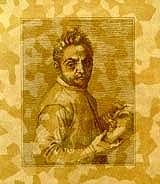This double bill was cleverly conceived and worked well, using the same basic set by Charles Edwards. This subverted brilliantly the laws of gravity and conventions of perspective. For the Donizzeti a chandelier hung at an oblique angle from the ceiling. Both operas were played in settings with 'false' angles and 'untrue' recessions of walls, windows and door-frames. With minimal means these stage pictures hit the nail on the head, letting us know at a glance that matters are out of joint in the society depicted, helping to draw attention to the underlying significance of these operas and their place in the 19th C. cultural and social revolutions of the time, giving a voice to ordinary folk and subverting the hold on the audiences' imaginations of 'aristocratic' themes.Both are farcical operas which deal with thwarted young lovers who trick their families, the invention of another character, and the use of disguises facilitating the denouements. The socially inferior Ernesto & Schicchi are mocked but outwit their 'betters'. This is particularly complicated in Il giovedi grasso - Carnival Thursday (the day before Good Friday, when practical joking was usual in Naples). The Donizetti farce is a rarity and was given in an excellent English version by Clive Timms, making it easier to follow the turns and twists of the plot.
Puccini's popular black comedy, one part of the rarely mounted Trittico, is about money, the root of all hope. It is set in Florence, a panorama of which is disclosed at the end, in Stephen Medcalf's resourceful production of the familiar old tale of grasping relatives after legacies, the tables turned on them by their expected saviour, who pops into the deceased's bed and fakes his 'recovery', himself coming out on top financially and his daughter (who had pleaded with her Beloved Daddy in the piece's most famous aria) getting together with the love of her young life to live, we hope, happily ever after.
The high standard of singing and well characterised acting by the multi-national Guildhall students was impressive, invidious to single out individuals with so many of great promise. I will remember Sophie Karthauser's sincerity and pure voice in Carnival Thursday, and Gianni Schicchi more as a group exercise, with the 'mourners' responding to their changing fortunes by moving suddenly around the stage like a massed pack of predatory black birds, dressed by Sophie Bugeaud with some splendid hats - the strings of their disillusion being pulled by puppeteer Hans Voschezang's eponymous hero. Buoso's bed was given a life of its own!
I should have welcomed sur-titles, to get more of the jokes, and perhaps GSMD's Technical Theatre Staff might try to afford involvement of a media studies student project to provide them for future productions in original languages?
The orchestra distinguished itself, under Clive Timms, head of Opera Studies, and the GSMD Conducting Fellow, Jason Lai, who took over the performance of Carnival Sunday on the evening which S&H covered. I've never heard it sound so fully professional and idiomatic. The best college opera can sometimes equal the costly pleasures of productions by major opera companies, turning to advantage the intrinsic expenditure limits within which they must deploy abundant creative imagination.
Alexa & Peter Woolf

 Return to:
Return to: